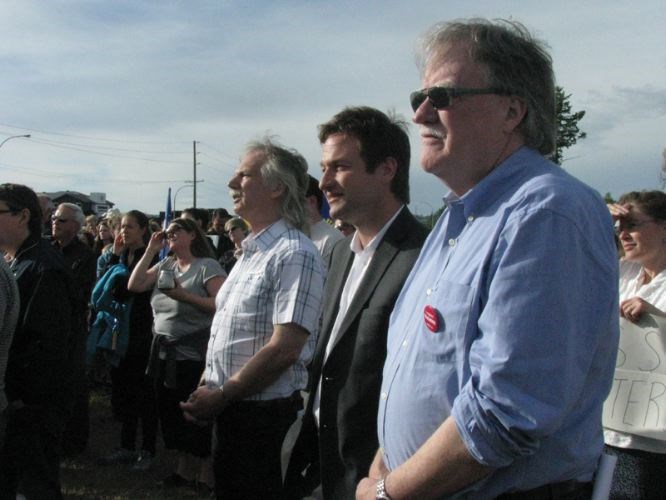It's key for teachers and fellow union members to stand together in the ongoing labour dispute between public educators and the provincial government, said B.C. Federation of Labour president Jim Sinclair.
Speaking to hundreds of parents, teachers, children and supporters from the bed of a pick-up truck outside the School District 57 office, Sinclair was the last to add his thundering voice to the list of speakers rallying behind teachers.
"That's our weapon - we have to protect that and build that," he said. "It starts with the labour movement sticking together with people, walking the picket lines, standing up and speaking out with you as well and making sure at the end of the day, that when you walk back into those classrooms, we can all walk into all of our workplaces with our heads held high in dignity that we did the job that was necessary."
Organized by the Prince George and District Teachers' Association and the North Central Labour Council, Tuesday night's rally was well attended by union members of all stripes in support of the B.C. Teachers' Federation.
Flags representing organizations such as the B.C. Government and Service Employees' Union, Canadian Union of Public Employees (CUPE), Unifor, Canadian Union of Postal Workers and the Public Service Alliance of Canada flew above the heads of those in the crowd, who punctuated each speaker's addresses with cheers and cries of "shame" against the B.C. Liberal government.
Janet Bigelow, president of CUPE 1048 representing the inside workers at the city of Prince George as well as the regional vice president of the north for CUPE B.C., said her organization understands BCTF's fight.
"You know what you have to do with bullies? You can't back down you have to push forward and fight them," she said, adding that future teachers are in trouble if the public education system isn't fixed and today's children aren't educated properly.
There were as many words of support for the teachers, who have been on strike since June 17, as there were expressions of dismay and disgust aimed at Education Minister Peter Fassbender and Premier Christy Clark.
B.C. NDP education critic Rob Fleming added his voice to the mix, calling out the government for spending money on a front-page newspaper ad in Vancouver calling the the BCTF's proposed wage increase unaffordable.
"Just when you thought the depths of cynicism couldn't be plunged any deeper than it has been in B.C. when you had minister Fassbender and other people in the government saying 'sorry, there's no money for teachers, there's no money for kids, there's no money for special supports that we need, there's no money for classrooms,' voila, there's money for attack ads on paid media with your tax dollars in the middle of a protracted labour dispute," Fleming said.
BCTF president Jim Iker said teachers are looking for compromise and that the bargaining team has made "significant moves" in their wage demands.
"It's time the government saw public education as an investment, not an expenditure," he said.
Part of that investment is a BCTF call for $225 million annual workload fund to address issues of class size, composition and staffing ratios in the interim between now and the Court of Appeal decision on the teacher-favourable B.C. Supreme Court ruling handed down in January. That decision said the government was unconstitutional when it passed legislation deleting terms in the teachers' collective agreement.
Smaller class sizes can provide important one-on-one time, said Iker.
"It's not just about making sure that they are able to do well on a test. It's being able to help them with their learning; to be able to talk with them; have that time to spend time with them; that they are a somebody. And that's why smaller classes are important - so every one of our students in our classroom is a somebody. Because they're our children and we're entrusted with them."


